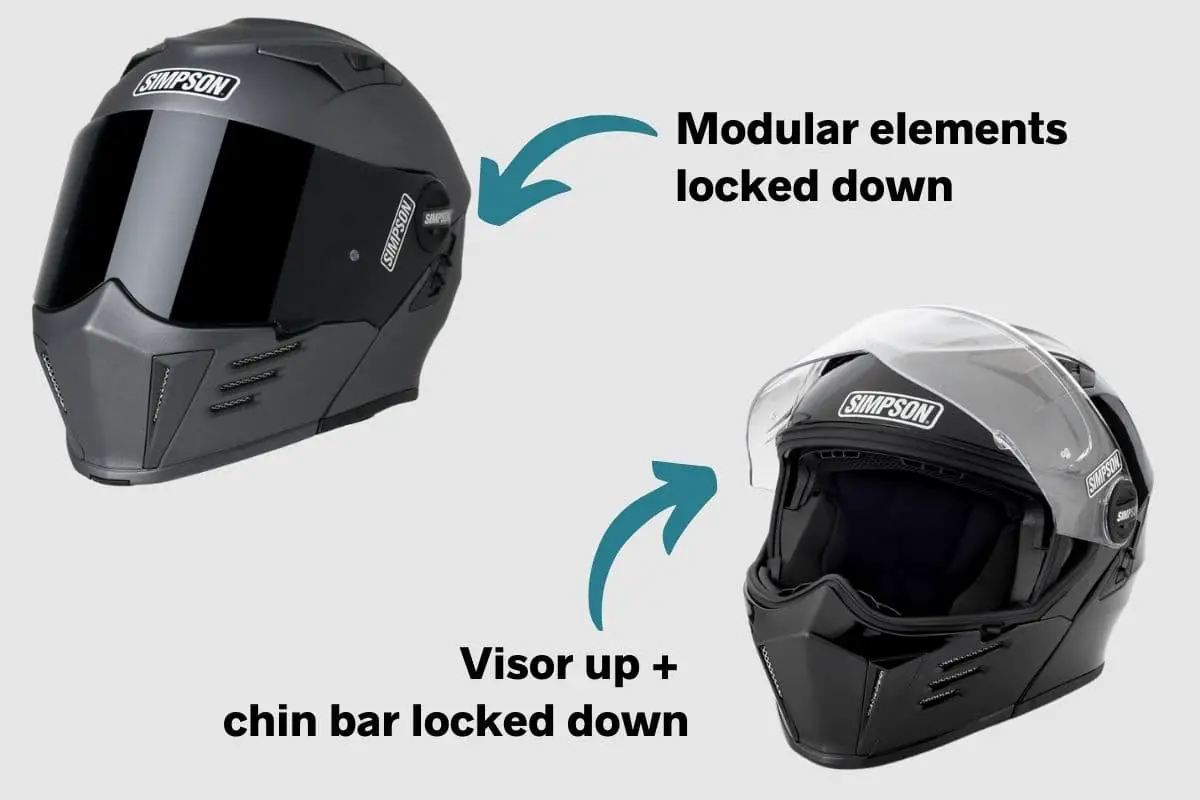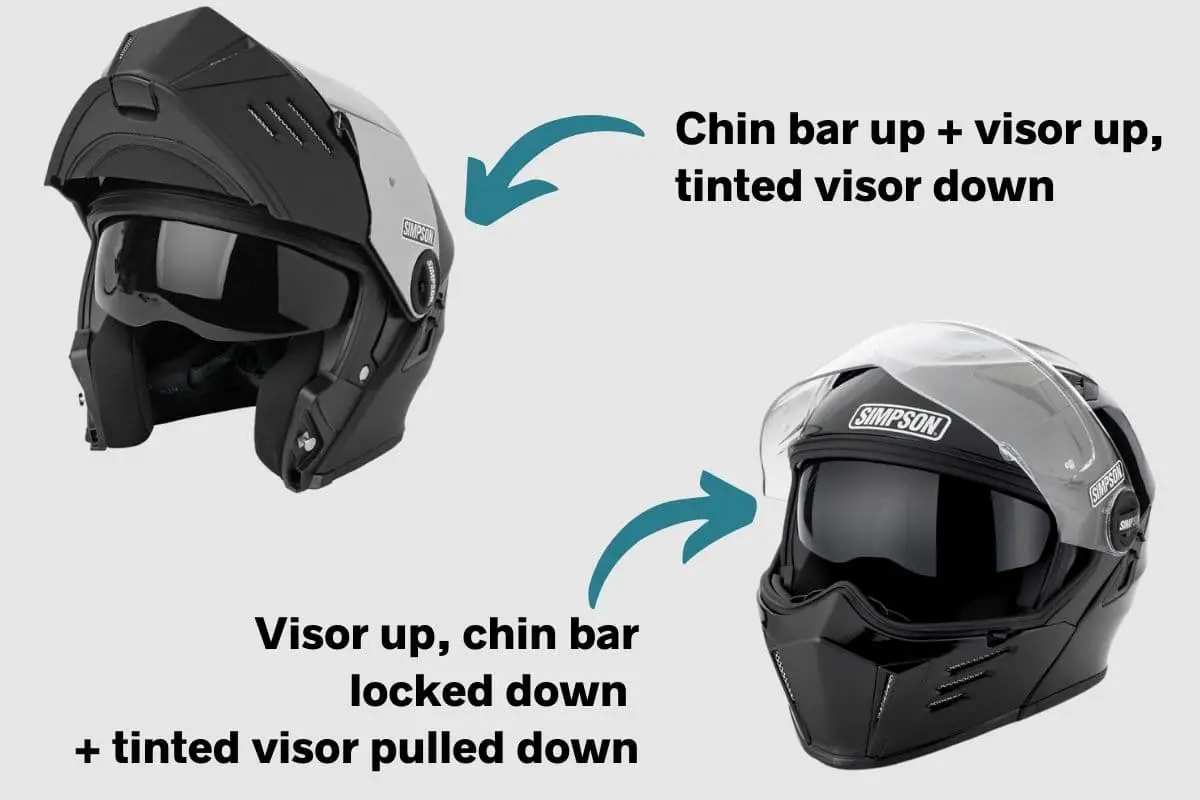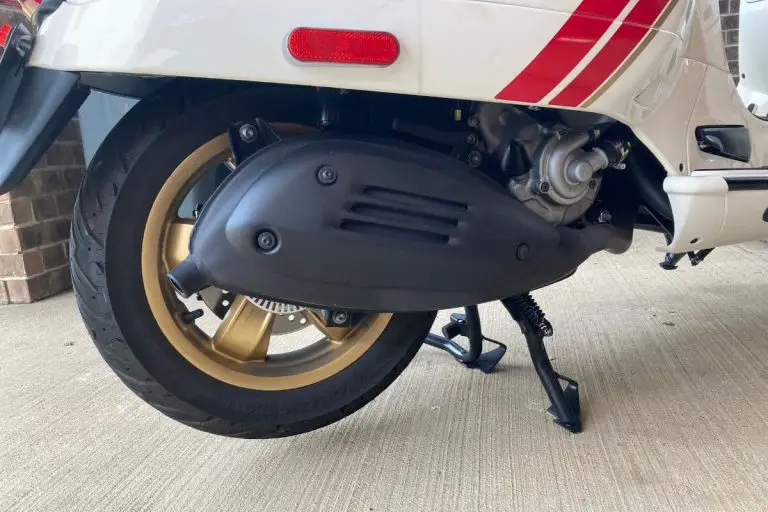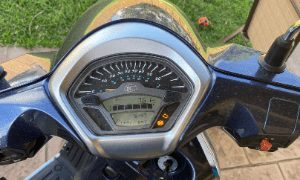Buying a helmet is a mix of choosing one that is safe, comfortable AND fits well. However, there are a ton of different kinds of helmets out there. It can be hard to decide which one is right for you. This is where the pros and cons of modular helmets come in!
Depending on what how you’re riding, some helmets will suit you better than others. When buying a helmet, you can choose from open-face helmet, closed-face helmet, half helmets, off-road helmets, dual sport helmets, and of course, modular helmets.
What exactly are the pros & cons over other types of motorcycle helmets to help you make the right choice for safety, comfort, and your wallet.
Jump to my Top Modular Helmet Pick
(Revzilla.com)
What Is a Modular Helmet?
If you’re new to the world of two-wheel riding, you may not know what exactly a modular helmet is. In terms of design, modular helmets are meant to act as a compromise between closed- and open-face motorcycle helmets.
Modular helmets have a hinge that allows the rider to flip up the chin bar and visor. When closed, a locking mechanism keeps the rider’s head protected similar to a full-face helmet.
This way, you don’t have to choose between a fully-enclosed helmet or one that is wide-open. You get both in one convenient package.
Is it hot out, and you’d like a little more air at a stop light? Just flip the helmet up. They are sometimes called a flip-up helmet when you’re out and about.
Generally, modular helmets are primarily designed with upright visibility in mind. While they do have safety certifications, not all approve of modular helmets. We’ll dive more on these differences, but this is where they tend to differ the most from traditional helmet styles.
Otherwise, they follow the standard rules of helmets in general. They have the different interior shapes (intermediate, round, and long oval). They come in a variety of looks (graphics or solid), and they have a variety of features.

Pros of Modular Helmets
First, the good. There are plenty of positive aspects that make a modular motorcycle helmet appealing to certain riders.
Flexible + Practical
The big advantage of wearing a modular helmet is how versatile and practical they can be. Especially when compared to a full-face helmet.
Convenience
Since the chin bar can be moved, you can grab a drink of water without having to take off the entire helmet. I can’t manage straws when I have a full-face helmet on, and it’s annoying because I WANT PROTECTION + WATER.
I also find it easier to take my helmet off when I take it off with the chin bar up.
Communicating WITH Your Helmet On
The movable chin bar and visor also make it easier to communicate with others while wearing the helmet. Having your face fully covered makes it very difficult to have a quick chat to mention you need to stop for gas or stopped at a light.
For Those That Wear Glasses
Modular helmets are also sometimes a bit more accommodating for riders who wear glasses. I hear your mileage may vary (pun always intended) on this, but it is an option to try out if you find yourself struggling to find a helmet for glasses. You can take the ‘pressure’ off from time to time by flipping the bottom up.
Heat Relief
Best advantage to this Texas rider is that you can get extra airflow if you need it at a stop.
Generally, modular helmets are designed to offer the greatest balance between safety, comfort, and functionality. They provide more protection than an open-faced helmet, while still offering basically the same levels of practicality and comfort.
Safety Considerations
As far as advantages of a modular helmet to an open face version is simply the safety aspect. Since the full-face is the safest option think of a modular as a pretty significant step up in terms of safety over an open face helmet when thinking of the level of protection it provides.
You should have your eyes covered and protected if you are an open-face helmet wearer, so an additional perk is that the modular helmet will cover those bases without an extra piece of gear to remember.
I feel like modular helmets are getting a lot of the nice-to-have features getting layered in at a faster rate than you’ll find with the more traditional helmets.
For example, a lot of modern modular helmets now come with cool features like integrated Bluetooth speakers and dual visors. Many modular helmets also come with an anti-fogging coating on the main visor, and some of them are designed to seamlessly integrate a motorcycle intercom like the Sena and Cardo systems, as well.

Cons of Modular Helmets
You can’t gloss over the cons when you wanna dive into the pros and cons of modular helmets. While modular helmets are great for a lot of reasons, they’re not perfect helmets. It’s never a bad idea to get the full picture of something before you go out spend a hundreds.
In truth, there are no major disadvantages to wearing a modular helmet, but that doesn’t mean it’s a perfect helmet!
Price
The most noticeable con to motorcycle helmets is the price. Due to the complexity of their design, modular helmets are usually more expensive than other types of helmets. The difference is about $100 based on the average price of popular motorcycle helmets.
Weight
Modular helmets are also a bit heavier than other types of helmets. They have additional components that are required to be modular and still safe.
All of the components that allow the chin bar and visor to flip up add weight. It is possible that you might find your neck getting a bit tired if you’re wearing a modular helmet on a long trip.
It’s rare to find a modular helmet that weighs less than three pounds.
Safety
While modular helmets are certainly safer than open-faced or half-helmets, they’re not as safe as closed-faced helmets for a couple of reasons. The main reason has to do with the fact that the chin bar is a separate, movable piece of the helmet.
Modular helmets have a locking mechanism, but any moving part (also like retractable sun visors) makes the chin bar a weak spot in the event of a crash.
➡️➡️ Are modular helmets less safe? ⬅️⬅️
The other reason that makes modular helmets slightly less protective is the issues that can occur if you decide to ride with the visor is up.
Beyond the obvious eye and impact issues, the wind could catch on the visor and give your head a good yank or even pull the helmet off your head if you don’t have it secured properly.
The modular component basically becomes a wind catcher instead of being a more aerodynamic helmet. Additionally, a raised visor also has the potential to snag on something, which increases the risk of you sustaining a severe injury even if not super likely.
With that being said, you can mitigate this risk by just keeping the visor/chin bar down whenever you’re riding.
This can also add to more road noise. Read here to make your motorcycle helmet quieter if the noise gets to you.
The safety concern also translates to no modular helmet yet meeting the SNELL guidelines for safety. The DOT and ECE ratings exist them, so it’s not that they are completely unsafe. They each test different elements in different ways, but some consider SNELL to be a gold-standard.
Wind Noise
It’s been reported as well that modular helmets add a bit more wind noise than closed-face helmets. The gaps in the helmet where the chin bar connects can allow extra air in. The extra air means extra noise to deal with.
Layer in a bit of added complexity of the movable chin bar which means that there’s technically more stuff on the helmet that can break. Maintain your helmet well, or you might end up with a chin bar that doesn’t fit snugly if something gets bent.
Field of Vision Slightly Limited
Lastly, the field of vision of a modular helmet is fine if you are in an upright position. If you will be in a more aggressive, sport-like riding position, the modular helmet could limit what you see.
So try them out while in the store as you’re weighing the pros and cons of modular helmets. Some stores will have a motorcycle you can sit on, so you can check out how it affects vision.
Should You Get a Modular Helmet?
So, now that we’ve discussed the pros and cons of modular helmets, the big question is: should you get one?
Ultimately, this depends on your personal needs as a motorcycle rider and where you’ll most likely be using your helmet.
The truth is that modular helmets are pretty much always going to provide you with the best balance between the advantages of all the other types of helmets if you are willing to overlook the cons discussed.
While modular helmets are not quite as safe as a full-face model, they’re still safer than open-faced or half-helmets. You may also find a modular model more comfortable and usable during day-to-day riding than closed-face helmets are.
I recommend you get yourself a modular helmet – particularly if you live where the heat can be downright stifling. Besides, I’d rather see you protected than not wearing a helmet at all because you’re not comfortable!
Read more about how to choose a helmet here, or go straight to my recommendation here with Revzilla.





